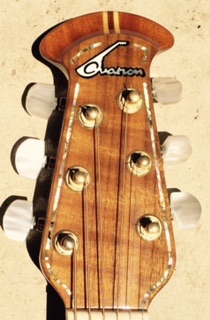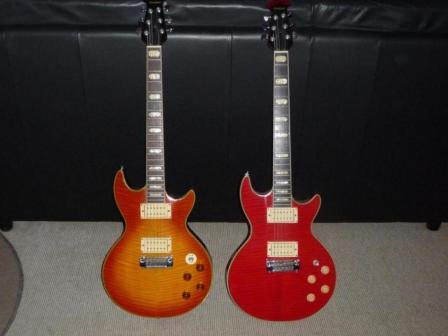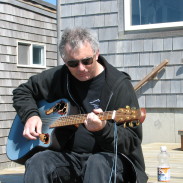|
|

Joined:
August 2005
Posts: 3736
Location: Sunshine State, Australia | This is slightly OT because it's not an Ovation bass but...
My "72 Fender P bass has amazing sustain - except for one note. The 7th fret on the G string (D) has virtually no sustain. Up a fret to D# - great. Down a fret to C# - equally good. Back to D - nada!
Really weird. |
|
| |
|

Joined:
January 2006
Posts: 5881
Location: Colorado Rocky Mountains | Maybe it has its own built-in notch filter. |
|
| |
|
Joined:
February 2002
Posts: 5750
Location: Scotland | It's quite common for basses in general and Fender-style basses in particular to have dead spots at certain notes. In a nutshell it happens when the neck resonates at the same frequency as a particular note and dampens energy transference to the body at that frequency. The more rigid the neck the less the chance of dead spots. Laminated necks, necks with carbon fibre stiffeners or complete graphite necks were all developed to minimise dead spots. Sometimes using a headstock weight such as the Groove Tubes Fat Finger can eliminate a dead spot (it also has an equal chance of just moving it to a different note) |
|
| |
|
Joined:
March 2004
Posts: 629
Location: Houston, Texas | Interesting.
Would a super slight tweak on the truss rod change the resonant frequency and take care of the problem, or just move it to a different note?
If you could move it to a half note, it might be a compromise, but an improvement. |
|
| |
|

Joined:
August 2005
Posts: 3736
Location: Sunshine State, Australia | Let me see if I've got this right - if there is a dead spot caused by the mass of the string resonating with the mass of the neck, by altering the mass of the headstock, the dead spot could be eliminated, reduced or moved?
Yes?
Alternatively, wouldn't changing the mass of the string have a similar effect, like if I re-strung it with a different gauge?
Also Paul, what do you think of Joyful's suggestion? |
|
| |
|
Joined:
February 2002
Posts: 5750
Location: Scotland | Muzza, it's not the mass of the string that's the
problem. It's the freqency of a specific note exciting a resonant frequency of the neck, This causes the neck to vibrate in sympathy and dampens energy transference to the body, causing the note to decay very quickly. Doesn't matter what string guage you use, the frequency of the problem note remains a constant. For example, B at the 4th fret 1st string has a frequency of 124Hz no matter what the thickness or material the string is made of
Adding mass to the headstock might do one of 4 things. (note use of the word "might")The dead spot will be elimated, reduced, moved to a different fret or there may be no effect at all. You can experiment by placing a smallish woodworkers G-clamp or two on the headstock. If that works a GT FatFinger might be a good investment
Adjusting the truss-rod is a non-starter. It's not affecting the mass of the neck, and could screw-up the neck releif. |
|
| |
|

Joined:
January 2009
Posts: 4535
Location: Flahdaw | Just out of curiosity, would that deadness travel to each octave of that note up and down the fretboard? |
|
| |
|

Joined:
April 2004
Posts: 13303
Location: Latitude 39.56819, Longitude -105.080066 | I think it is based on the "frequency" of the note and not the octave........ |
|
| |
|

Joined:
January 2002
Posts: 14127
Location: 6 String Ranch | I've noticed a similar problem on some Taylor guitars. It starts at the low E and goes to the High E at the 12th fret. They just get no sounds at all. Really weird. |
|
| |
|

Joined:
December 2006
Posts: 6996
Location: Jet City | Originally posted by Paul Templeman:
It's quite common for basses in general and Fender-style basses in particular to have dead spots at certain notes. In a nutshell it happens when the neck resonates at the same frequency as a particular note and dampens energy transference to the body at that frequency. The more rigid the neck the less the chance of dead spots. Laminated necks, necks with carbon fibre stiffeners or complete graphite necks were all developed to minimise dead spots. Sometimes using a headstock weight such as the Groove Tubes Fat Finger can eliminate a dead spot (it also has an equal chance of just moving it to a different note) Hey Temp, wasn't the Alvarez Dana Scoop designed because of this issue? |
|
| |
|

Joined:
June 2007
Posts: 3084
Location: Brisbane Australia | Originally posted by Beal:
I've noticed a similar problem on some Taylor guitars. It starts at the low E and goes to the High E at the 12th fret. They just get no sounds at all. Really weird. :D :D :D |
|
| |
|
Joined:
March 2004
Posts: 629
Location: Houston, Texas | Originally posted by Paul Templeman:
Adjusting the truss-rod is a non-starter. It's not affecting the mass of the neck, and could screw-up the neck releif. First off, a big grin to Beal as well. :D
But, my engineering background makes me suspect that the truss rod adjustment might make a difference.
I agree with Paul about the string mass because no matter what the mass is, you are tuning it to vibrate at a specific frequency by adjusting the tension.
In the case of the truss rod adjustment you are essentially adjusting the tension or stiffness but the mass remains constant, so it would only make sense that the resonant frequency would change.
Yeah, it would affect the neck relief but it would seem to me that it wouldn't take that much of a tweak to shift the freqency enough avoid the dampening effect yet keep the neck relief within acceptable limits. Maybe not for the faint of heart to experiment with but that's just my technical intuition.
I've never had an instrument with that problem, (well, except for one ex-girlfriend who had nasty habits), so I will concede to greater experience, but I'm always interested in that sort of thing.
Curious minds want to know! ;) |
|
| |
|

Joined:
August 2005
Posts: 3736
Location: Sunshine State, Australia | Joyful, I intended to lower the action by a smidgin anyway, so I'll let you know if it makes any difference - before I start attaching F clamps all over the headstock.
Great Punk look, eh? |
|
| |
|
Joined:
February 2002
Posts: 5750
Location: Scotland | Originally posted by Damon67:
[/qb] Hey Temp, wasn't the Alvarez Dana Scoop designed because of this issue? [/QB]
If memory serves it was intended to eliminate phase cancellation between the neck and body, which would in theory improve sustain, though I think the patent only covered the upper fret access aspect of the design. |
|
| |
|

Joined:
February 2005
Posts: 11840
Location: closely held secret | Paul, I honestly don't know why you bother, but I'm glad you do. I learn something every time you post. |
|
| |
 Bass Sustain question
Bass Sustain question Bass Sustain question
Bass Sustain question